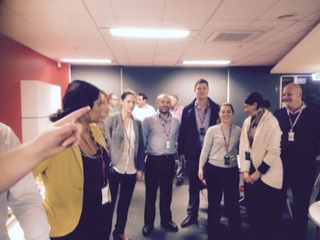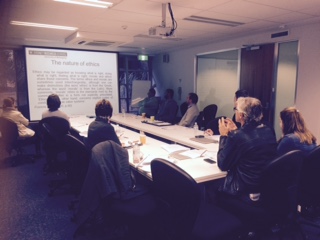|
By Brent Cooper The Leadership Illawarra Program cohort recently attended an intense one day Governance and Ethics Master Class with UOW Professor John Glynn (Executive Dean - Sydney Business School).
To continue with the Theme of Governance and Ethics, the cohort visited Pillar Administration to learn firsthand the role Governance and Ethics plays in the running of the company. This is the second time Pillar have invited participants of the LIP to visit their head office. Pillar is one of Australia’s leading superannuation administration providers, with more than $100 billion under administration across 1.1 million member accounts. Dave Perry, the Senior Manager of Organisational Development for Pillar opened the session with an interesting exercise that required each member of the cohort to introduce another group member, rather than simply introducing themselves. Luckily we were all well equipped for the situation thanks to a similar exercise that group took part in at the Adaptive Leadership Workshop carried out earlier in the month, presented by Illawarra Flame Tree Coaching and Development. Following the introduction exercise, Managing Director & CEO Peter Brook opened the discussion with an overview of the superannuation industry. He also described the changes that the industry has experienced in recent times, including a period of substantial growth and increased regulation, and how this has impacted on the running of the organisation. He recalled how Pillar has had to continually invest into new ideas in order to stay competitive and “provide excellent member experience”. He also explained the importance of strategic thinking and forward planning. Given the current theme of LIP it was only fitting that Stuart Watson (Executive General Manger Risk) and Fatima Abbas (Executive General Manager Corporate Services) discuss Corporate Governance and Business Ethics. Stuart spoke on the importance of good Corporate Governance and the fundamental principles required to achieve a sound Corporate Governance framework. Stuart later touched on Corporate Social Responsibility and the role organisations have in shaping our future. Fatima kicked off the session on ethics by presenting a short clip from the “Dilbert” cartoon - https://www.youtube.com/watch?v=A-6QnKuJs5o. She then went on to explain the concept of Ethics and how we see it in today’s society, which lead into an explanation of how Pillar’s core values underpin the running of the organisation, and thus ensure ethical practice. This in-turn enables Pillar to demonstrate social responsibility and consideration for the local environment and community. The day concluded with an afternoon tea an opportunity for the cohort to network with Pillar Executives and Senior Management. The cohort was very appreciative of the time and effort that Pillar put into the visit and we would all like to visit again during the program to hear about the innovative changes taking place at Pillar.
0 Comments
by Dr Alison Freeman The second Masterclass for this cohort of the Leadership Illawarra Program addressed the topic of Governance & Ethics. A full day workshop, led by UOW’s Executive Dean of the Faculty of Business, Professor John Glynn, gave participants an overview of the theory and some real life examples of corporate governance – both good and bad.
Given that the average term for an Australian CEO is about 4 years, and for an Executive Director is about 5 years, the group considered what drives these individuals. How we can ensure strong governance in a corporate environment that is often driven by financial motivations and personal career aspirations rather than on longer-term organisational views? The tension between corporate law and codes of practice was also explored. How do we balance the profit-focus of corporate law with the broader-based codes of practice which assume an element of social responsibility? For example, is Corporate Social Responsibility the role of the Board, or is the Board solely responsible for maximising shareholder return? Professor Glynn led the group through two examples of failed corporate governance:
|
AuthorBlog posts written by the Leadership Illawarra Program. Archives
December 2023
Categories |
Leadership Illawarra Program is hosted by Regional Development Australia (RDA) Illawarra. 2024
Privacy Policy
Privacy Policy




 RSS Feed
RSS Feed